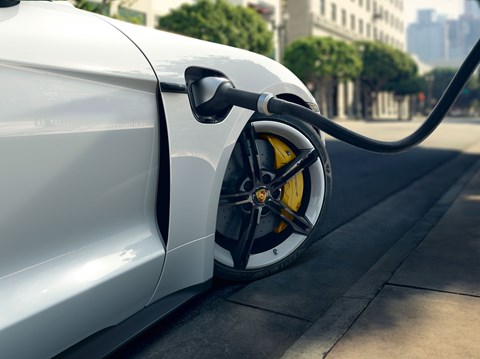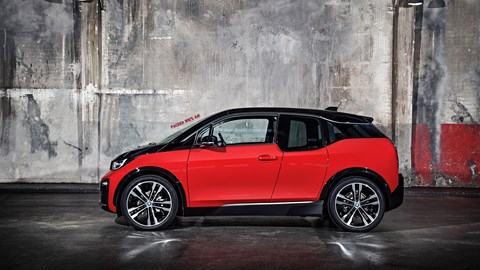► Electric car tax: how it works
► VED, benefit-in-kind and more
► Are there still EV tax advantages?
The UK government has announced plans to make owners of electric cars pay Vehicle Excise Duty (VED) from 2025 – a change from current rules that exempt such electric vehicles (EVs) from this kind of road tax. It reflects how the tax advantages of EVs is gradually being eroded as they become more mainstream.
The decision came as part of the 2022 Autumn Statement, as the Chancellor looks to plug a sizeable hole in the public finances. But it may leave a lot of EV owners feeling hard done-by once their efforts to reduce emissions are no longer being so actively supported. Especially considering the rising cost of energy means that electric cars are much more expensive to run than they used to be.
There’s still a decent incentive to choose an electric company car, however. Although benefit-in-kind electric car tax is going up, it’s still a fraction of the cost of old-school petrol and diesel car tax.
How electric car tax works in the UK
All UK motorists pay to drive their cars on British roads – and electric cars are no different. But the rate at which they’re taxed has varied substantially from petrol and diesel cars in recent years, as the government encouraged adoption of EVs with a range of tax rebates, credits and incentives.

Typically, pure electric cars have attracted the very cheapest rate of taxes, saving more than hybrid cars which still rely to a greater or lesser degree on fossil fuels. In this guide we look at the way battery cars are taxed in each department.
VED for EVs: the annual tax bill
Everyone has to pay Vehicle Excise Duty, or VED, to drive on British roads. This used to be called the annual tax disc, but the paper car tax disc was scrapped in 2013. The good news is that VED still costs much less for many EV owners right now.
If you’re buying an electric car costing less than £40,000 brand new (including options), then you’ll not pay a penny in VED. However, if you are considering a premium EV costing more than that threshold, you’re lumped in with gas guzzlers and will pay a higher rate. The same applies to plug-in and hybrid cars that cost over £40k.
Remember that even though electric cars may be exempt from VED bills at the moment, you still have to apply to tax your car in the normal way each year on the government car tax website; you must also get an MOT in the same way as regular cars.
In 2025, the electric car tax distinction will disappear altogether, and EV owners will have to pay VED at the same rate as petrol and diesel models within their pricing thresholds. This will apply to existing EVs as well as brand new ones – at current rates that would mean an annual bill of £165 after the first year (though we can also expect the rate to have gone up by then).
In the first year, tax cost is based on CO2 as well as price point. Removing the 0g/km CO2 exemption for electric cars means that the exemption for some older, low-CO2 combustion cars will be binned as well.
Benefit-in-kind: electric car company car tax
A major change was introduced on 6 April 2020 for the 2020-21 tax year, meaning that a full electric company car attracted 0% benefit-in-kind, rising to 1% in 2021-22 and 2% in 2022-23. This is a major perk for company car drivers – owning a company-supplied EV is a bit of a no-brainer and a major saving for any fleet drivers.
Supplier Octopus Electric Vehicles estimated that the 2020 tax changes could save a typical business driver around £7000 over three years.

While this benefit was aimed at changing end-user behaviour, there are still numerous upsides for employers providing EVs for their staff: companies going electric will also benefit from National Insurance savings and capital allowances, making it win-win for businesses choosing electric vehicles.
Ian Johnston, CEO of high-speed charging network Osprey Charging, said: ‘The elimination of benefit-in-kind tax for electric vehicles marks a significant milestone in the journey towards mass adoption. It now makes complete financial sense for millions of drivers across the UK to go electric.
‘Not only will this directly increase the numbers of electric vehicles on the road today, it will also give a huge boost to the all-important second hand electric vehicle market, building momentum for wider electric vehicle adoption in two to three years’ time.’
Company car tax calculator on our sister website Parkers.co.uk
Fuel tax and electric cars
Because electricity is universal, and the taxman can’t differentiate between the energy used to power your kettle from your car, there is no special duty paid on energy used to recharge your EV’s battery. This is a positive: there is no fuel duty escalator to make your electricity bills balloon every time you fill up. Remember that nearly 60p of every litre of petrol goes straight to the taxman.
So as you can see from the above, choosing an electric car is a great way to save tax for British motorists – but the fiscal advantage is slowly being eroded as EVs become more mainstream. This was perhaps inevitable; we never assumed that HMRC would watch everyone plug in and wave goodbye to its motorists’ tax take.
If you’re considering taking the plunge and choosing an electric car, our advice is to look past the initially steeper purchase price and do the maths to work out how much you’ll save each year – in VED car tax, benefit-in-kind (if appropriate), fuel costs and any congestion charges in your area. Only once you’ve done the calculation will you know whether you’d be better off by plugging in or waiting a bit longer.
Further electric car reading
The best electric cars and EVs on sale today
How much does it cost to charge an EV?
The cheapest electric cars on sale
Longest range EVs
The best SUVs